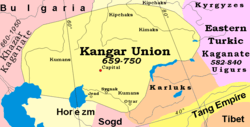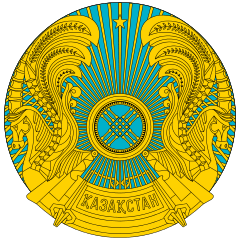Kangar union
Kangar union, Kazakh: Қaңғар Oдағy (Qanghar Odaghu) was a Turkic state in the territory of the entire modern Kazakhstan without Zhetysu. The ethnic name Kangar is an early medieval name for the Kangly people, who are now part of the Kazakh, Uzbek,[1] and Karakalpak nations. The capital of the Kangar union was located in the Ulytau mountains. The Pechenegs, three of whose tribes were known as Kangar (Greek: Καγγαρ), after being defeated by the Oghuzes, Karluks, and Kimek-Kypchaks, attacked the Bulgars and established the Pecheneg state in Eastern Europe (840-990 CE).
Kangar Odagy | |||||||||||||||
|---|---|---|---|---|---|---|---|---|---|---|---|---|---|---|---|
| 659–750 | |||||||||||||||
 Kangar Union after fall of Western Turkic Khaganate, 659-750 | |||||||||||||||
| Capital | located in Ulutau mountains | ||||||||||||||
| Common languages | Old Turkic | ||||||||||||||
| Religion | Tengriism | ||||||||||||||
| Khan (title) | |||||||||||||||
| Legislature | Kurultai (Qurultay) | ||||||||||||||
| History | |||||||||||||||
• Established | 659 | ||||||||||||||
• Disestablished | 750 | ||||||||||||||
| Area | |||||||||||||||
| 5,000,000 km2 (1,900,000 sq mi) | |||||||||||||||
| |||||||||||||||
| History of the Turkic peoples pre-14th century |
|---|
History of the Turkic peoples |
| Göktürks |
|
| Khazar Khaganate 618–1048 |
| Xueyantuo 628–646 |
| Kangar union 659–750 |
| Turk Shahi 665-850 |
| Türgesh Khaganate 699–766 |
| Kimek confederation 743–1035 |
| Uyghur Khaganate 744–840 |
| Oghuz Yabgu State 750–1055 |
| Karluk Yabgu State 756–940 |
| Kara-Khanid Khanate 840–1212 |
| Ganzhou Uyghur Kingdom 848–1036 |
| Qocho 856–1335 |
| Pecheneg Khanates 860–1091 |
| Ghaznavid Empire 963–1186 |
| Seljuk Empire 1037–1194 |
| Cumania 1067–1239 |
| Khwarazmian Empire 1077–1231 |
| Kerait Khanate 11th century–13th century |
| Delhi Sultanate 1206–1526 |
| Qarlughid Kingdom 1224–1266 |
| Golden Horde 1240s–1502 |
| Mamluk Sultanate (Cairo) 1250–1517 |
Part of a series on the |
||||||||||||||||||||||||
|---|---|---|---|---|---|---|---|---|---|---|---|---|---|---|---|---|---|---|---|---|---|---|---|---|
| History of Kazakhstan | ||||||||||||||||||||||||
 | ||||||||||||||||||||||||
| Ancient | ||||||||||||||||||||||||
|
||||||||||||||||||||||||
| Khanates | ||||||||||||||||||||||||
|
||||||||||||||||||||||||
| Colonization and post-nomadic period | ||||||||||||||||||||||||
|
||||||||||||||||||||||||
| Topics | ||||||||||||||||||||||||
Etymology
The Kengeres, mentioned in the Orkhon inscriptions, were possibly known in the Islamic world and in the west as Kangar, a collective name for three Pecheneg tribes (of eight).[2] Byzantine emperor Constantine Porphyrogenitus stated that Kangar signified nobleness and bravery.[3] Ukrainian historian Omeljan Pritsak suggested that Kangar originated from Tocharian A *kânk "stone" and Kengeres combined Kenger with the Iranian ethnonym As, supposedly from *ârs < *âvrs < *Aoruša (Greek: Αορσοι). However, Golden objected that *Aoruša would have yielded Ors/Urs and Pritsak's opinion on the Kengeres-Kangars' ethnonym and mixed Tocharian-Iranian origin remained "highly hypothetical".[4] Other Orientalists, Marquart, Toltsov, Klyashtorny, attempted to connect the Kangar and Kengeres to the Qanglı, the eastern grouping of the Cuman-Kipchak confederation as well as the Indo-European Kangju in Chinese sources. Akhinžanov proposed that the Kipchaks simply assumed the name Qanglı (literally "wagon") after taking over the Kang region.[5] Nevertheless, all of these connections, if any, remain unclear.
Independence
After the capture of Zhetysu by the Chinese, Kangars become independent from the Turkic Kaganate. The Syr Darya cities retained their autonomy. The Oguzes in the southern Kazakhstan, Kimaks in the Irtysh River valley, Cumans in Mugodjar, and Kypchaks in the northern Kazakhstan became the vassals of the Kangar union.
At the end of the 7th century the Syr Darya cities rebelled and formed an alliance with the Sogdiana. The revolt was successful, but the Moslem Arab armies attacked Sogdiana from the south. The revolt has waned, and Kangars consented to the continued autonomy of the Syr Darya cities.
Fall of the Union
At the beginning of the 8th century the Oghuz confederation and the city of Tashkent seceded from the Kangar union. The Arabs continued raiding Sygnakh, Jend, and other rich Kangar cities. The Oguzes formed an alliance with the Kimaks and Karluks, and their joint assault defeated the Kangars, whose union dissolved.[6] Three Kangar tribes and five allied Turkic tribes, under the collective name Pecheneg, later carved out a realm, which bordered both the Ouzes and the Khazars, in Eastern Europe.
See also
- Pechenegs
- Kankalis (a people possibly related to the Kangars)
- Kangju
- Senior Juz
- History of the central steppe
- Turkic peoples
- Timeline of Turks (500-1300)
- List of Turkic dynasties and countries
Notes
- Tolstoi V.P. Origin of the Karakalpak people//KSIE, Moscow, 1947. p.75
- P.Golubovsky, Pechenegs, Torks, and Polovetses before Tatar invasion, SPb, 1884. p.55, in L.Gumilev, Ancient Türks, Ch.20 (In Russian)
- Constantine Porphyrogenitus, De Administrando Imperio
- Golden, Peter B. (1992). An Introduction to the History of the Turkic People. Otto Harrassowitz, Wiesbaden. p. 264–265.
- Golden 1992, p. 273.
- Golden, Peter B. (1992). An Introduction to the History of the Turkic People. Otto Harrassowitz, Wiesbaden.
Further reading
- Gumilev L.N., History of Hun People, Moscow, 'Science', (In Russian) Ch.11.
- Kadyrbaev A.Sh. Chinese sources of Mongolian epoch about foreign political relations of Kazakhstan Türkic nomads (Kypchaks-Kangly) with peoples of Central Asia and Far East//Society and state in China. Moscow, 1982, (In Russian)
- Zuev Yu.A., Early Turks: Essays on history and ideology, Almaty, Daik-Press, 2002, (In Russian), ISBN 9985-4-4152-9
